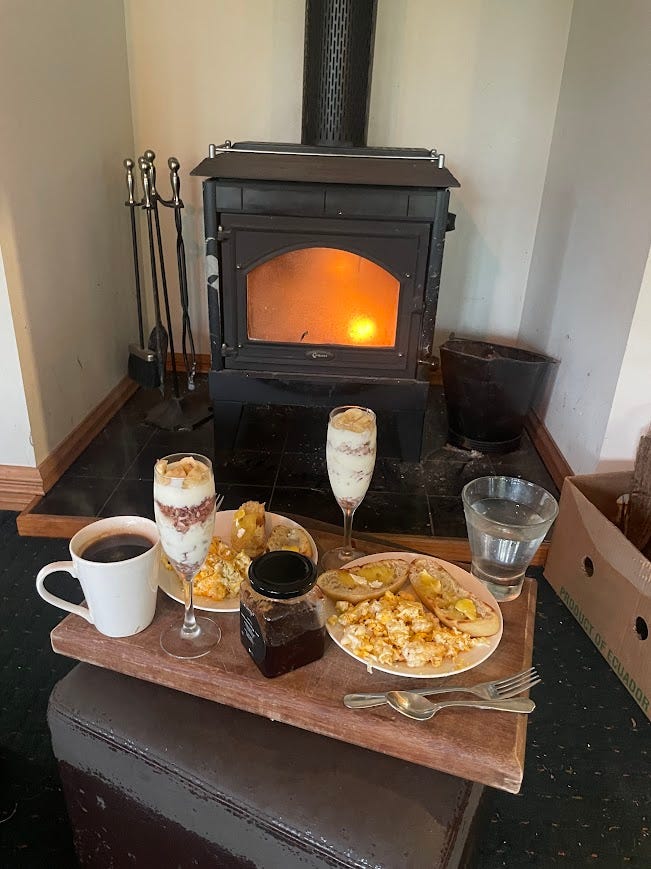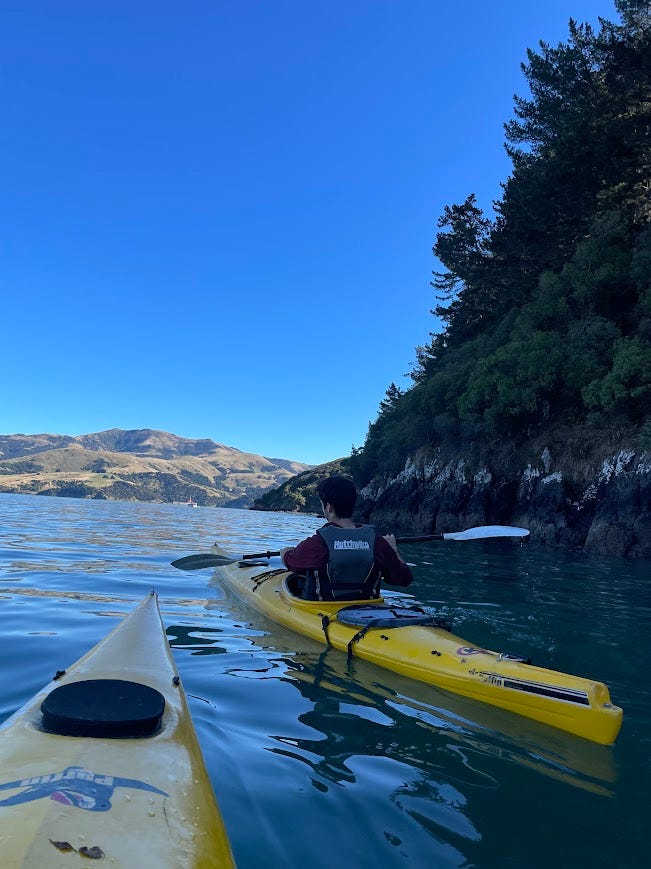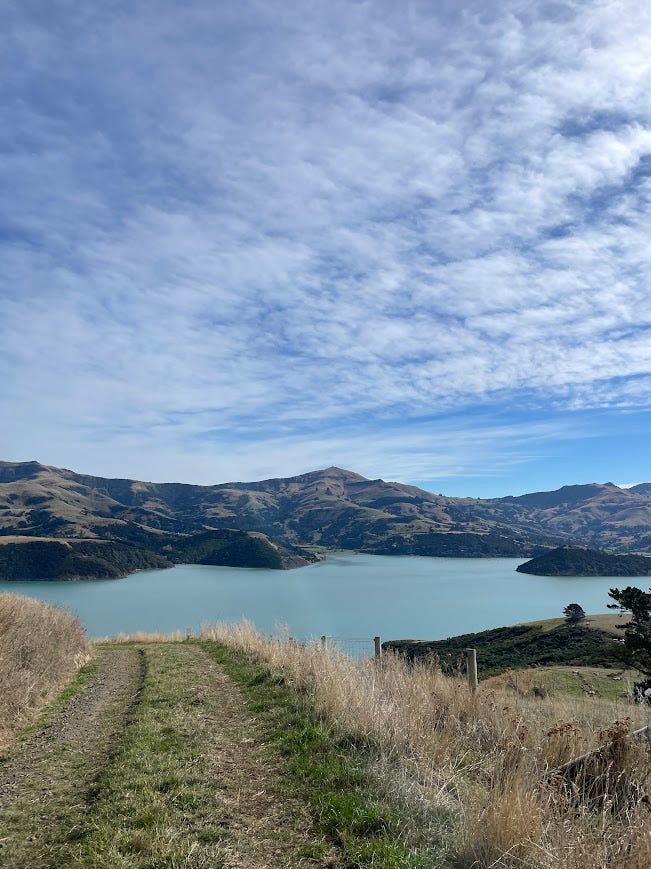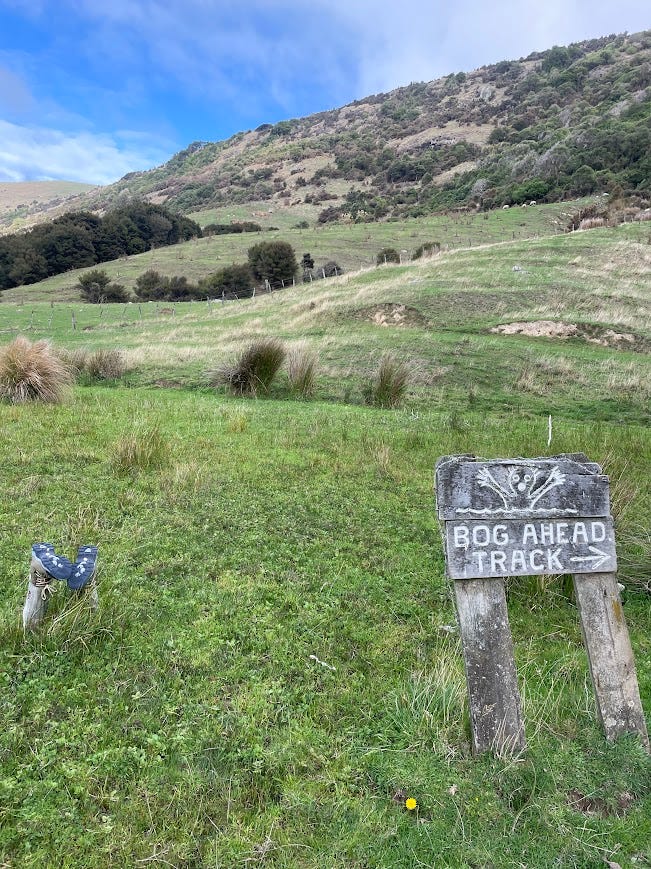Hello from an autumn day in Akaroa! While we mentioned in our last post that we are finally putting the work into our working holiday, we had too much to say about the community first to go into detail about our jobs!
Our relationship to work was one of the topics we originally set out to explore in this blog. Are our daydreams just hobbies that we should just enjoy and not try to monetize, or are they viable alternative career paths? Can you work a job you are passionate about without having that passion taken advantage of by your employer? At the very least, is it possible to have a better relationship with work than I have thus far?
While I’ve written about work ethic, our brush with unpaid labor, and lots of topics related to work, this is the first time I’ve actually worked (if you define work as a job you’re paid for) in five months! And man, it feels good. My jobs were rarely of the 60+ hours a week variety, but they certainly demanded a lot of me in other ways. I feel mentally uncluttered now that I am not spending so much effort trying to solve impactful issues through my job while simultaneously being denied the ability to actually do so. I feel physically free and mobile, after the isolation of the pandemic followed by return-to-office requirements. I spent almost three months decompressing with friends and family, playing board games and sleeping 10+ hours a day. Then we spent 9 weeks or so traveling in New Zealand before getting our first jobs here!
What About Seasonal Work Works for Us?
As a reminder, we are waiting tables at a restaurant that is popular among locals, but derives the most profit from the thousands of tourists who visit the town each year. We are being paid the New Zealand minimum wage of about $23 an hour, which is about $14 USD an hour, working about 35 hours per week. Tipping is uncommon in New Zealand, so we may get an extra few bucks here and there, but mostly rely on our hourly wage.
To get this many hours, we work a lot of doubles, meaning we work both the lunch and dinner shifts, broken up by an unpaid 90-minute meal break in the middle. On a working holiday (or what I imagine it would be like to do seasonal work back home, say, at a national park or ski resort), what works is that we are on the same schedule as pretty much everyone we know. Our coworkers have started fishing at the wharf together on our mid-afternoon breaks, and the fact that almost no one has to work early means people are willing to start a D&D game late-night after work (a great skill of community-building and creativity offered to the group by Chris!) And luckily for us, we really like our coworkers! Unlike what feels like potentially a frattier vibe in somewhere like Queenstown, Akaroa seems to attract people looking for something a little more chill.
In my “normal life,” this would be a tough schedule. As a night owl, I’ve long dreamed of a later start to work. However, working both day and night does make it feel like we are at work all the time. Since the end of our shift depends on how much business we have, it would be virtually impossible to commit to evening or weekend plans with friends who work a 9-5. It also means that the time of day we eat (and what we eat) is thrown off from our normal rhythms. While I can see a lifestyle in which having a good breakfast and a large mid-afternoon meal in place of lunch/dinner could work, we definitely find ourselves starving by the end of many shifts. We don’t get a staff meal, which is often typical of the service industry here and elsewhere. While we occasionally get some extras from the kitchen, one cannot depend on french fries alone for sustenance.

For us, seasonal work has been easy because our pay far exceeds our expenses, allowing us to start building funds back up for the rest of our trip while still enjoying our time here. Originally, I had thought that this is because the minimum wage in New Zealand is a living wage (defined as the income necessary to meet basic needs). But it’s more complicated than that! According to MIT’s Living Wage Calculator, zero states in the U.S. have a minimum wage that meets the definition of a living wage. In some states, it would take minimum wage increases of over $10 an hour to achieve this. In New Zealand, an independent group called Living Wage Movement Aotearoa has calculated and advocated for a living wage since 2012. While the minimum wage trails the living wage by a few dollars, the New Zealand government has adopted the living wage for its contractors, and there is a growing list of accredited living wage employers. So while we aren’t technically making the nationally-defined living wage (about $26 NZD), our low costs as seasonal workers means we still have a wage that allows us to meet our basic needs and have what we feel is a good quality of life without using our U.S. money.
Though there are many online calculators with questionable methodologies that will try to do so, it’s also hard to truly compare cost of living and quality of life across countries, especially when our lifestyle is atypical of the average New Zealander, or even working similar professions in the U.S. These factors are hard to compare even between places in New Zealand, much less between two countries made up of thousands of smaller communities. There are so many intangible things that are hard to account for – maybe produce costs a bit more at the grocery store, but there are also roadside spots where we’ve gotten a haul of fresh farm veggies for a few U.S. dollars! As we wrote about in our experiences with WWOOFing in Auckland or repair cafes, New Zealand has felt like a place where people have shared abundant skills and resources in a way that makes life both cheaper and more enjoyable. The dozens of feijoas in our kitchen from our head chef’s tree are evidence of that here! And there are so many elements of quality of life, like one’s social life, that feel very satisfying here while looking very different from back home!

In our experience, the overall cost of living in New Zealand feels slightly lower than the U.S. This felt true when we had the purchasing power of our U.S. money, and it still feels true now that we are using our New Zealand money. In the least scientific comparison possible, I’ve observed that buying a cafe sandwich here is about half an hour’s minimum wage ($6-7 USD compared to our $14/hour wage), while buying a cafe sandwich in the U.S. ($11-14) would be 1.5-2 hours of a federal minimum wage ($7.25) (all of this being before taxes). Some groceries are much more expensive due to the cost of import or having to grow everything on an island, but other things (soft cheeses, thankfully) are cheaper. Gas is much, much more expensive ($8-9 USD per gallon), though we almost never drive living in a walkable small town). While we don’t live in a typical apartment, rent is generally cheaper than the U.S., even in cities. Healthcare and education are much, much cheaper here, though we aren’t paying for either. Our income tax rate will be about 10%, which would be similar if not slightly lower than if we were making the same wage in the U.S. (notably, tax rates are steeper for middle-income earners in New Zealand than in the U.S.). While the income we’re making isn’t a lot, we expect to live comfortably off it for months in our van. Stay tuned for another post on finances and the working holiday, as I’ve only scratched the surface here!
On the flip side, there’s a “company town” feeling to seasonal work that makes it affordable but would not feel sustainable in the long-term. We live with our coworkers on/in the restaurant owner’s essentially neglected investment property. It’s an old lodge with great bones, but currently has mold, mice, and one trash collection bin for 17 people. Our manager literally gets a cut of our rent, and requests for improvements around the house feel very awkward. Several staff are on a 3-year work visa, which means their immigration status is tied directly to their employer, who is also the landlord, creating an uncomfortable sense of control. But it’s also quite cheap – $30 USD a week per person in the van, or $65 USD per person per week if we were living inside. Living anywhere else in this small, touristy town would be expensive or simply unavailable to seasonal workers. Thankfully, because we have our van and like our housemates, our time here is an overall positive experience despite the less than ideal aspects of this setup. And in listening to everyone’s wildly different paths to this experience we are all sharing, it has reinforced the lesson from our campervan post that an expensive apartment in a major city and a van in New Zealand are not the only two options, even if they’re the only ones I’ve tried so far.
All Jobs Are The Same
In my first Recess post, I wrote about the motivation for this sabbatical/recess/working holiday stemming from burnout. For a decision that was heavily influenced by disillusionment with my job at the time, I included very few specifics about it given the political nature of my work. Of course, detailing my grievances with my last job was never the point. I knew even then that what I really needed was distance and time from those stressors, to get away from them before they hardened into a twin desperation and inability to leave. The desperation to leave stemming from the larger structural and cultural issues of the organization mixed with daily slights, the latter of which could be forgotten were it not for the stubbornness of the former. The inability to leave stemming from being convinced that all workplaces are this dysfunctional, that anywhere you go will be the same or worse (so better the devil you know than the one you don’t, right?)
But even when I tried to explain my decision to leave to family and friends, I often found myself coming up short for a justification of why my situation felt so intolerable. Being underpaid and overworked are two commonly cited reasons for burnout, and at the time I left my job, I was neither. There were elements of my job I found fulfilling, and I worked with a lot of amazing people. But the organization also had elements of a toxic and dysfunctional work culture. An MIT study found that toxic culture was the largest predictor of employee attrition in 2021 by a landslide – 10 times more powerful than compensation. While this term has become prevalent, the looseness of the definition still made it hard to back up what I was feeling with evidence rather than just sound like I was complaining about normal aspects of having a job. The article posits: “Employees grumble about a lot of things, but which elements of culture are so awful that they qualify as toxic? You might gripe about an old-school or bureaucratic culture, but is that enough to knot your stomach as you pull into the parking lot in the morning?” By the time I would walk the long way to my desk in the morning to avoid having to interact with anyone, it was becoming clear I was experiencing the latter.
As I start another job and start to think about what comes after this working holiday, many of my fears and frustrations about the nature of work are coming up from my past negative experiences. Sometimes, when I daydream about going into other industries, I find myself in the worst place anyone should ever willingly go: Reddit comments. I read about all of the problems of my new fantasy industry, as commenters destroy the OP’s dreams, and I leave disillusioned thinking all jobs are the same. While I know this isn’t true, it’s clear that many industries have similar issues, and there are surprising similarities between my worst days waiting tables and working in government. Having another work experience under very different circumstances has helped me distill a few key themes of an unhealthy work culture that led me to burnout and poor wellbeing.
Unclear and inconsistent expectations: Dysfunctional organizations often have unclear and inconsistent expectations for what it means to do a good job, or to just do your job at all! You may be given instructions to do something in a certain way, and later get your wrist slapped for doing so. Managers who feel a need to assert their power will die on the hill of hyper-specific preferences that don’t actually matter that much to the success of the organization. Bad managers often criticize staff for mistakes they didn’t actually make, while being ignorant or negligent of mistakes staff actually are making, limiting opportunities for true, useful mentorship and growth.
Culture of surveillance and punishment: Dysfunctional organizations often have people in management who have an irrational obsession that people on the bottom rungs are not doing their jobs, and in turn create a culture of surveillance that often leads to busy work (“productivity theater” spans industries, I’ve learned). Alongside the culture of surveillance, management regularly takes away staff benefits or imposes new limitations with no clear explanation of the cause for these measures or their value to the organization. In turn, people at the bottom of the organization often develop false or partially true assumptions about the reasons behind those actions and those who enforce them. Middle managers are often both recipients and enforcers of this culture, which can create an erosion of trust between managers and their staff that harms the mission of the organization, not to mention a growing sense of cognitive dissonance for middle managers themselves.
Public face: People who are your “stakeholders” (customers, members of the public, political appointees) may rudely air out their frustrations on you personally about something you ultimately have no control over. For the most part, you just have to take it and offer them platitudes that just serve as the next jumping off point for their rant. While this can be true across all organizations, what sets apart a dysfunctional organization is when workers actually share the frustrations of the stakeholders, but have to publicly defend the same issues of the organization that are negatively affecting them.
All Jobs Are Not The Same
While waiting tables and working in government are tactically very different jobs, the more salient difference between them is how much their issues impact my wellbeing. At my government jobs, I cared so much about everything. Even if I had little control over strategic decisions, I felt aware of and invested in them, as they affected how I approached and felt about my work. And my jobs (at least in theory) had a big impact, as I was providing information to inform policy decisions that affect people’s lives. Here, as long as I get everyone’s severe allergy orders right, the worst that can happen as a result of my actions is that someone has a bad time dining out. And at my last job, I cared a lot and was impacted heavily by the dysfunctional culture! Here, I might fundamentally disagree with upper management and feel that staff are not valued, but I am ultimately here for two months, not long enough to be a part of team retreats where we try to reform the culture.

Another reason that I don’t have to care that much is because I am not working for tips! For the most part, New Zealanders (and tourists visiting from other places) are friendly and gracious diners. However, of course we get the occasional entitled jerk. And while I do have to maintain some level of professionalism, I actually do not have to cater to them being rude to me about things I have no control over. If anything, a few British coworkers have encouraged us to be less accommodating (lol). While our U.S. coworkers do feel like they were paid better in a tip-based system, customers shouldn’t have a weirdly personal power dynamic over whether their server gets paid fairly (is it so hard to believe that people deserve a living wage even if they have a bad day at their jobs?)
Finally, there is no illusion that I am going to be here long-term. While my generation switches jobs far more frequently than previous ones, it still feels taboo to acknowledge you don’t plan to be at a job forever. In the past, I felt like I had to pretend I had no plans to ever leave until the day I announced my resignation, which can be damaging to relationships and disruptive to projects you want to leave in a good place. While there are certainly potential risks of an organization not investing in employees they know are leaving, a shift in perspective towards a job being a temporary arrangement that both parties are getting something out of feels healthy. I can view anything as a learning experience, or at least just an experience, if I don’t feel stuck there. While this is more of a personal mental shift I need to make, I also see possibilities for a more mutually productive and fulfilling relationship for both employers and employees if there were more curiosity and openness about employees’ larger goals for their lives, and where this job fits into it and for how long.
Some questions I’m still asking: Is being entrenched in an organization’s deeper issues the price you pay for having a job you care about? Are all organizations somewhat dysfunctional (or vulnerable to becoming so), and is it inevitable to face drama the longer you stay somewhere? Is it really possible to tell if an organization is dysfunctional before you agree to work there? Are there strategies to insulate yourself from a bad culture if you have other reasons for wanting to remain at the organization? For my friends who work for functional organizations, what are they doing right? Please tell me your thoughts!
What Else?
As I write this post, we have recently started our second job here as trappers for a local conservation organization! I’m still marveling at how we were being paid to do something beneficial for the local ecosystem while going on a beautiful hike, which even had some geocaching-like components (just finding dead rodents in the forest instead of cute little tokens). It was exciting to talk to some of the staff about the really cool educational programs and research they are doing in the area, as well as careers that make space for a wide variety of skills and interests. It made me feel excited and hopeful for the possibilities of future work, and we’ll definitely be writing more about it soon! Until then, you can find me crawling through the bush looking for wooden boxes and trying to figure out how to be half as charming of a waiter as Chris!





